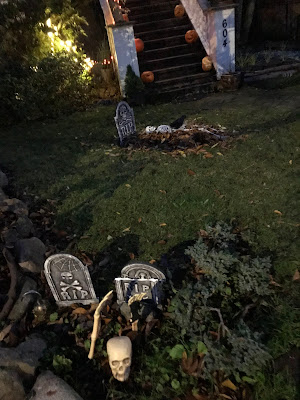This is a tale of two great-aunts. One is mine; one is the Resident Fan Boy's. I'll tell you the tale of my great-aunt first -- although, in this case, it's more about her husband. Not because he was more important or interesting, but because I'd never thought much about him -- until last week.
Ever since testing Demeter's DNA at Ancestry a little over a year ago, I've been working through hundreds of matches, labeling whether they are paternal or maternal, and, if possible, to which branch they belong.
It's not boring work, but, the smaller the number of centiMorgans shared, the more likely it is that there are few clues to connections. Sometimes my mind wanders.
Last week, as I marked and noted, I found myself thinking about my great-aunt, who was swept away in the final wave of the great influenza pandemic. She died on February 19, 1919 in Wolverhampton, at age 26, struggling to speak to her husband of six months.
It occurred to me that I didn't know when her widower died. All I really knew about him was that he was an army driver during World War One, and that, some time after losing his wife, he asked my grandmother, who was eight years her sister's junior, to marry him. She turned him down. (Obviously.) However, his name remained in her address book for at least the next decade.
I set about trying to find his death registration, but his name wasn't unusual, and there are several registrations for men bearing his name sharing his birth year, or thereabouts.
I found him in the 1891 census and narrowed down his birthdate to late February 1891, as he was noted as being six weeks old when the census was taken on April 5th. He was the only son, with many sisters, raised in Wolverhampton, as my grandmother and her siblings were.
I found a possible second marriage for him. My grandmother's address book, a birthday gift when she turned 19, ten months after her sister's death, has him first in Coventry, Warwickshire, then later in Newcastle-on-Tyne, as a manager for Daimler. The 1939 National Register, taken just after the United Kingdom declared war on Germany, has a fellow born in late February 1891, a manager for a motor company, with his wife -- whose given names match those for a marriage registered in Coventry, a little over a year after my great-aunt's death. The wife would have been almost the exact age of my grandmother.
However, the wife didn't have an unusual name either, so finding a death record was as daunting as locating one for her husband.
Before giving up, it occurred to me to double-check his World War One military record. I don't think I'd given it more than a glance.
As I'd mentioned, he was a driver for the army, signing up shortly after the declaration of war in 1914 -- in Coventry, as it happens. His army documents gave me a date of marriage, and it was different than what I had in my records: 11 July 1918 at St Jude Wolverhampton, my great-grandparents' parish church at the time.
I checked the dates of his postings. He had been given a furlough in order to be married, and returned to France ten days after the wedding, so the wedding date in his military record is the correct one.
He didn't return to Wolverhampton until nearly three months after the war ended. He left France on February 9th, 1919 -- ten days later, his bride died of influenza.
Out of six months of marriage, they had been together barely twenty days. (Oh gawd. Did he bring the contagion with him?)
I'll tell you the tale of the Resident Fan Boy's great-aunt tomorrow.
























